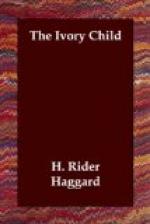As I knew we could not take the wagons beyond a certain point where there was a river called the Luba, unfordable by anything on wheels, I requested him, moreover, to send a hundred bearers with whatever escort might be necessary, to meet us on the banks of that river at a spot which was known to both of us. These words the messengers promised to deliver for a fee of five head of cattle apiece, to be paid on their return, or to their families if they died on the road, which cattle we purchased and left in charge of a chief, who was their kinsman. As it happened two of the poor fellows did die, one of them of cold in a swamp through which they took a short cut, and the other at the teeth of a hungry lion. The third, however, won through and delivered the message.
After resting for a fortnight in the northern parts of Zululand, to give time to our wayworn oxen to get some flesh on their bones in the warm bushveld where grass was plentiful even in the dry season, we trekked forward by a route known to Hans and myself. Indeed it was the same which we had followed on our journey from Mazituland after our expedition in search for the Holy Flower.
We took with us a small army of Zulu bearers. This, although they were difficult to feed in a country where no corn could be bought, proved fortunate in the end, since so many of our cattle died from tsetse bite that we were obliged to abandon one of the wagons, which meant that the goods it contained must be carried by men. At length we reached the banks of the river, and camped there one night by three tall peaks of rock which the natives called “The Three Doctors,” where I had instructed the messengers to tell the Mazitu to meet us. For four days we remained here, since rains in the interior had made the river quite impassable. Every morning I climbed the tallest of the “Doctors” and with my glasses looked over its broad yellow flood, searching the wide, bush-clad land beyond in the hope of discovering the Mazitu advancing to meet us. Not a man was to be seen, however, and on the fourth evening, as the river had now become fordable, we determined that we would cross on the morrow, leaving the remaining wagon, which it was impossible to drag over its rocky bottom, to be taken back to Natal by our drivers.
Here a difficulty arose. No promise of reward would induce any of our Zulu bearers even to wet their feet in the waters of this River Luba, which for some reason that I could not extract from them they declared to be tagati, that is, bewitched, to people of their blood. When I pointed out that three Zulus had already undertaken to cross it, they answered that those men were half-breeds, so that for them it was only half bewitched, but they thought that even so one or more of them would pay the penalty of death for this rash crime.
It chanced that this happened, for, as I have said, two of the poor fellows did die, though not, I think, owing to the magical properties of the waters of the Luba. This is how African superstitions are kept alive. Sooner or later some saying of the sort fulfils itself and then the instance is remembered and handed down for generations, while other instances in which nothing out of the common has occurred are not heeded, or are forgotten.




